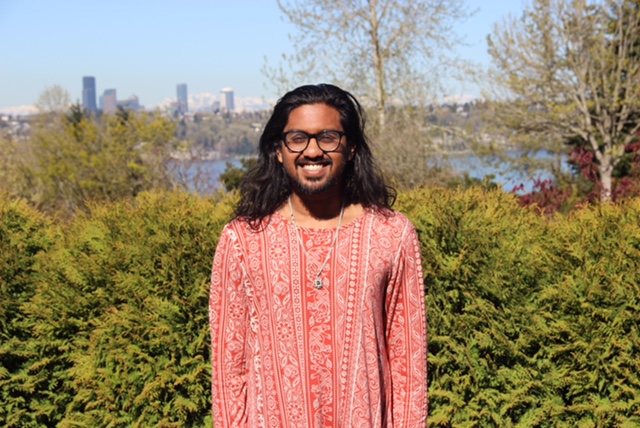As a freshman at Dartmouth College, Sanat Mohapatra struggled with his mental health as he faced a new and unfamiliar environment with high expectations. He was not alone. He soon discovered that many of his peers were experiencing similar struggles and turned to the anonymous chat forum Yik Yak to express themselves. But he also noticed that students’ honest outreach was often met with joking or malicious responses from others not interested in using the app for mental health support, so he built a different one.
After four years of hard work, Mohapatra, now a recent Dartmouth graduate, launched “Unmasked” in early 2020, an anonymous peer support app specifically for students dealing with mental health issues. Mohapatra says the combination of anonymity and dedicated focus is the key.
“I noticed that a lot of students were scared of using traditional mental health resources. They’re worried about how counselors would see them, and they felt like they didn’t have enough time in their busy schedules to make it to an appointment. The virtual anonymous forum was a really easy outlet for them to share and to connect with other students, but there wasn’t really a platform that was kind of specific to mental health, so that’s what inspired me to build an alternative,” says Mohapatra.
Through the Lombard Public Service Fellowship Grant, Mohapatra now works on Unmasked full time. Currently about 25% of the student body at Dartmouth has it downloaded. Forty-five other schools have the app up and running.
Students log on to the app and post what they’re thinking or feeling on a message board that is completely anonymous. Other students have the ability to comment or to direct message the anonymous student who posted. A team of senior moderators with crisis intervention experience ensure that the posts are non-threatening and if a student is unable to be helped and their life is in danger, the moderators are able to turn over the data to the school’s campus security. This process eliminates the risk of other students feeling like they have to support the student who posted when that student’s issue may be beyond the scope of the app. All students agree to these community guidelines and the data turnover policy in the terms and conditions.
But the app is not just an outlet for angst and the message boards have the full range of human emotions, which Mohapatra says is important. “It is really nice to go on and see ‘hey, a lot of people are feeling good today.’”
“I noticed that a lot of students were scared of using traditional mental health resources. They’re worried about how counselors would see them, and they felt like they didn’t have enough time in their busy schedules to make it to an appointment. The virtual anonymous forum was a really easy outlet for them to share and to connect with other students, but there wasn’t really a platform that was kind of specific to mental health, so that’s what inspired me to build an alternative,” says Mohapatra.
Mohapatra says the mission of Unmasked is to help as many students as possible in the context of their mental illnesses and to de-stigmatize mental health. Unmasked makes this possible by connecting students to mental health resources and also “normalizing having honest conversations with everyone in your life, like your friends, your family, or strangers at school.”
As students begin to share with their peers on the app, the stigma around mental health dissipates, opening a door for more professional help when necessary.
Mohapatra himself is a good example, as he sought out support for his own mental health needs. In addition to leaning on close friends, Mohapatra found professional help, which guided him to follow his passion and see things in a different perspective.
Developing the app had a positive impact on his own welllbeing.
“Building the app was really motivating for me,” he said. “Before that, I felt like I really didn’t have an outlet to pursue something I was really interested in. The app was a kind of process of creating something real that was not just about my knowledge or education but was way more about other people and that was really inspiring.”
Mohapatra switched his major from economics and government to English and creative writing, and “generally became more focused on being happy” rather than following some externally-imposed norm. Through grants from the Dartmouth centers, such as the Magnuson Center for Entrepreneurship, Mohapatra was able to work on building the app whenever he wasn’t studying, along with hiring help in areas in which he lacked knowledge.
“A lot of the building of Unmasked came from working with really talented students through these platforms that Dartmouth has, like the Entrepreneurship Center and the Startup Support Center,” he says.
Unmasked is growing quickly. In addition to already operating in over 40 schools across the country, there’s currently a big waitlist of schools interested in adopting the app. Mohapatra is working on building a more sustainable architecture for how all of moderation is run, which would enable Unmasked to scale quickly in the future. He plans to expand the app to include a universal message board, where any student from any university can read, post, and interact with students from all other institutions using the platform. With time, that all-schools message board would be open to any college student with a valid ‘edu’ email address.
Mohapatra is increasingly hearing from students at diverse colleges and universities (including international schools), about their interest in adopting the app on their campus. He also hears from administrations who are interested in learning more about the app, having heard about it from students on their campuses. “It’s awesome to know that this is cool enough for students that they reach out to their counseling centers and encourage them to reach out to us, because they’d love to bring this app to their school.”
As to its efficacy, most of the evidence is quantitative to date, though Mohapatra is working on a long-term psychological research study, including both users of Unmasked and a control population group, to see if the app actually improves student mental health based on a few key psychological tests to understand mental health. Mohapatra hopes the study will occur in the fall after receiving institutional approval to proceed.
In a short survey Unmasked released, 80% of responses showed mental health improvement after using the app. Additionally, Mohapatra shares that there’s a big folder of anonymous testimonials which helps validate its positive impact.
“I think it’s very heartwarming to read all of those comments,” he said. “It’s strange in the sense that I don’t personally know the users because it’s anonymous, but I can imagine all the humans on their phones using the app because the posts and the comments are so vivid. That makes me really happy to know that so many people have benefited from this platform in just the year. I think there’s so much more to do from here.”


